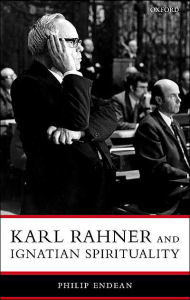
|
Posted September 3, 2005
Book: Karl Rahner and Ignatian Spirituality Author: Philip Endean Oxford University Press, England, pp. 291 An Excerpt from the Jacket:
An Excerpt from the Book: We have already referred to a famous passage in Ignatius’s Autobiography, recounting a particularly important experience he had at Manresa, by the banks of the River Cardoner: “As he was seated there, the eyes of his understanding began to be opened: not that he saw some vision, but understanding and knowing many things, spiritual things just as much as matters of faith and learning -- and this with an enlightenment so strong that all things seemed new to him. One cannot set out the particular things he understood then, though they were many: rather, he received a great clarity in his understanding, such that in the whole course of his life, right up to the sixty-two years he had completed, he does not think, gathering together all the helps he has had from God and all the things he has come to know (even if he joins them into one), that he has ever attained so much as on that single occasion.” Here if anywhere Ignatius was touch by God. Nothing happened to the river, but his whole being was transformed, and all things appeared new. Ignatius professes not to understand the process fully – a failure at once contrasting with and reflected by the luxuriant range of subsequent interpretation. But he is still using linguistic resources to articulate, however incompletely, a distinction between this experience and other experiences, and on that basis to readjust his whole world-view. Table of Contents: 1. Fragments, foundations, and bearings 2. The immediate experience of God 3. The mystical and the gracious 4. The Rahner brothers and the discovery of Jeronimo Nadal 5. Transcendence becoming thematic 6. Immediacy, mediation, and grounding 7. First principles 8. The standard of Christ 9. Decisions and discipleship 10. The decision of faith 11. Ignatius, Rahner, and theology |
|
